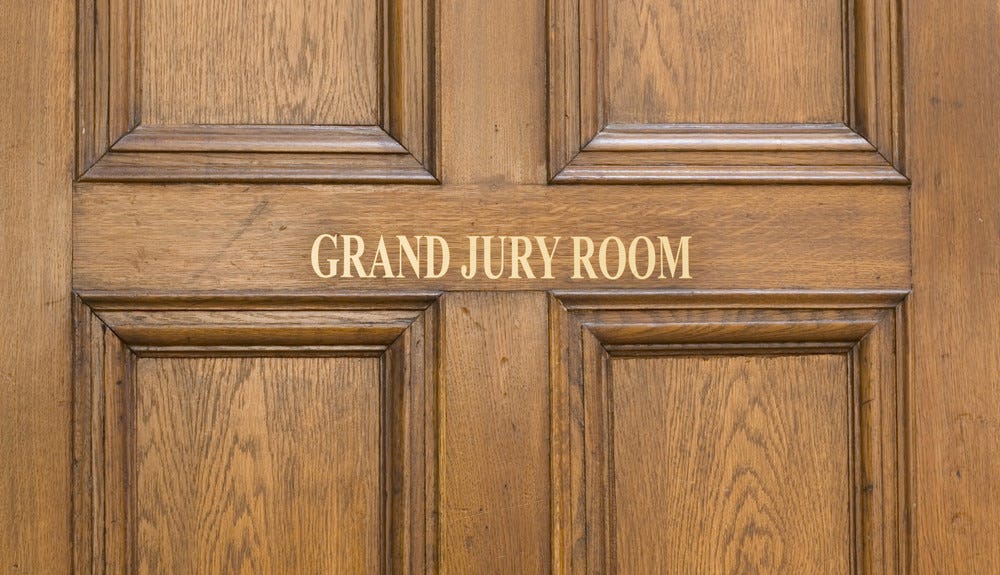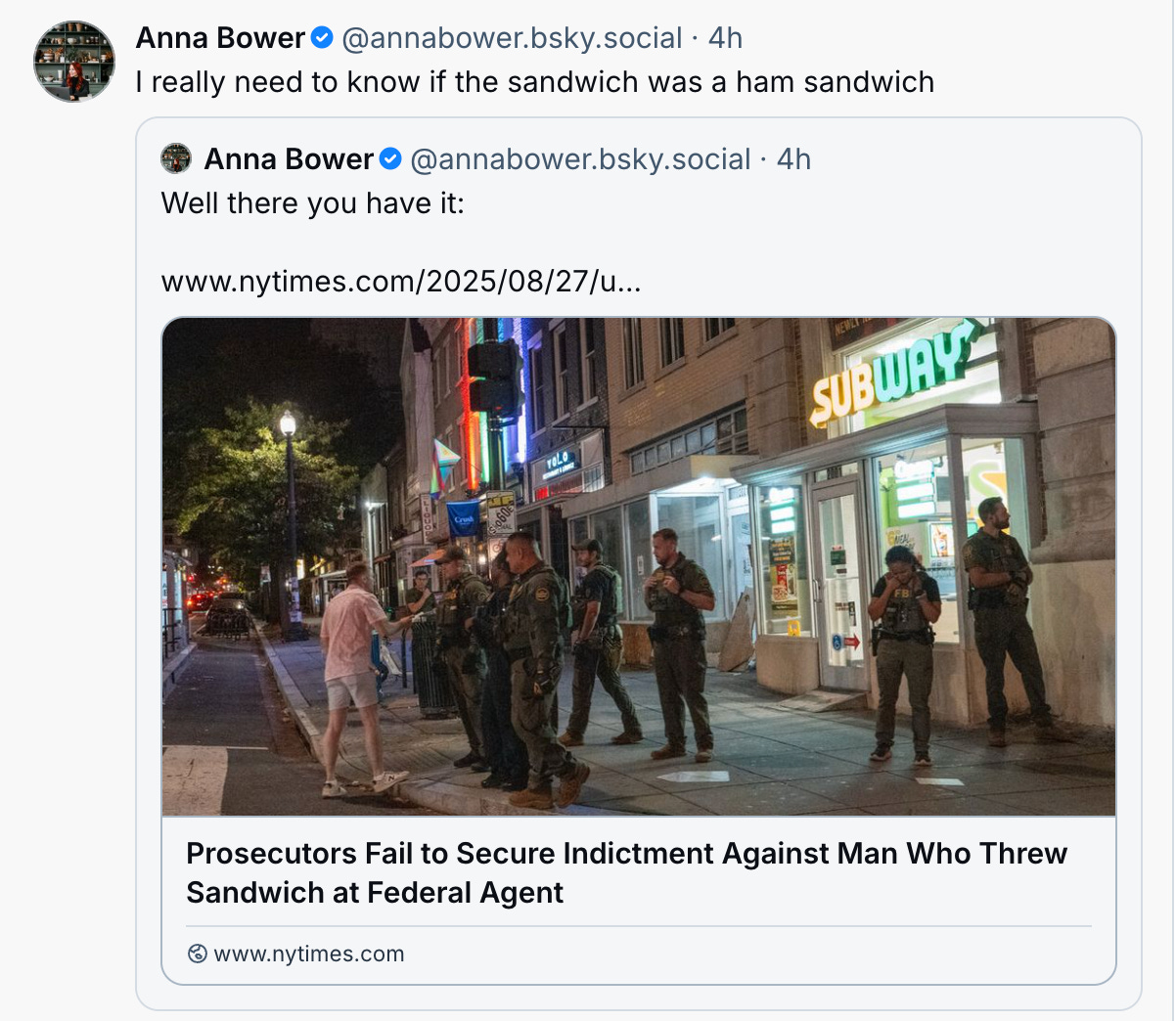The Grand Jury Emerges as a Check on Trump's DOJ
Grand jurors are refusing to indict flimsy felonies
The federal grand jury often doesn’t get a lot of respect. You’ve probably heard the old saying that a prosecutor can get a grand jury to indict a ham sandwich. Critics claim the grand jury is merely a rubber stamp and will do whatever the prosecutor wants; that it no longer serves any meaningful role in the justice system.
As I’ve written before and will discuss more below, I’ve always believed these critics are wrong. And now the Trump administration is learning the hard way that grand juries actually can act as a crucial check on prosecutorial power.
D.C. Grand Jurors Refuse to Indict
Recently my old office, the U.S. Attorney’s Office for the District of Columbia — headed by former Fox News host, election denier, and Trump sycophant Jeanine Pirro (it still pains me to write that) — asked a federal grand jury to indict Lori Reid for felony assault on a law enforcement officer.
Reid was involved in a scuffle with FBI agents who were transferring two prisoners from the DC jail into the custody of ICE. Reid was protesting and filming their actions, and officers allege she tried to impede their progress as they left the jail. An officer told her to step back and pushed her against a wall. Reid resisted and in the minor tussle that followed an FBI agent’s hand was pushed against a concrete wall, resulting in some minor abrasions. (I’ve seen the pictures, and I’ve gotten worse injuries working in my yard or playing with my dog).
Pirro’s office presented these facts to a D.C. federal grand jury and asked them to indict Reid for assaulting, resisting, or impeding a federal officer, a felony punishable by up to eight years in prison. When the grand jury refused, prosecutors tried again with a second grand jury. And then with a third. Each grand jury refused to return the indictment sought by prosecutors.
Pirro’s office said they will now charge Reid with a misdemeanor, which is punishable by a maximum of one year in prison and does not require a grand jury indictment.
Then this past Tuesday prosecutors from the same office failed to convince a grand jury to indict Sean Dunn, who famously threw a Subway sandwich at a Customs and Border Protection officer a couple of weeks ago while protesting the officer’s presence in the city. A video of the incident went viral on social media and Dunn became something of a folk hero. Pirro made a big point of talking tough about Dunn and saying her office will come down hard on anyone who interferes with law enforcement in D.C. Prosecutors charged him with felony assault and had him arrested.
Once again, the grand jury refused to indict. This news set off a predictable flurry of “ham sandwich” jokes among attorneys and commentators on social media:
(For what it’s worth, reportedly the Subway sandwich was salami.)
Prosecutors can try again, as they did with Reid – there is no bar on presenting a case to another grand jury if one grand jury refuses to indict. Or they may just decide to charge Dunn with a misdemeanor as well.
These failures to obtain indictments are – or at least should be – humiliating setbacks for the Justice Department. So what’s going on?
The Federal Grand Jury
The Constitution requires that every federal felony be indicted by a grand jury. This safeguard was inherited from the British legal system, where it dates back to the Magna Carta in the 13th century. To prevent the king from arbitrarily locking up people for improper reasons, British law required the Crown to present its evidence to a panel of residents of the local community to establish that criminal charges were justified. The case could only proceed if that group of citizens, the grand jury, approved the charges.
Recently free from the rule of an oppressive monarch, the framers of our Constitution built this same protection into our own Bill of Rights. The Fifth Amendment provides:
No person shall be held to answer for a capital, or otherwise infamous crime, unless on a presentment or indictment of a Grand Jury . . .
The Supreme Court has interpreted “infamous crime” to mean any felony.
Federal prosecutors can have people arrested for felony charges, but to proceed with the case they must obtain an indictment from a grand jury. A grand jury, like a trial jury, is made up of residents of the district where the alleged crime was committed. It usually has 22-23 members, and a quorum of 16 must be present in order for it to conduct any business. Unlike a trial jury that hears a single case, a federal grand jury typically sits for 18 months and hears evidence in many different cases.
Prosecutors seeking to pursue felony charges present their evidence to a grand jury in their district. When a grand jury votes to indict a case, it’s called a true bill; when it refuses to indict, it’s called a no true bill.
No True Bill
It’s hard to over-emphasize how rare it is for a grand jury to return a no true bill when prosecutors ask for an indictment. It almost never happens. In my twelve years as a prosecutor in that same D.C. U.S. Attorney’s Office I never had a grand jury return a no true bill. Ask any current or former federal prosecutor you know and they likely have had the same experience.
This is true for several reasons. First, the standard for returning an indictment is low: the grand jury need only find probable cause to support the charges, not the much more stringent proof beyond a reasonable doubt required for conviction at trial. Unlike a trial verdict the vote to indict need not be unanimous; only twelve grand jurors out of a minimum of 16 present need to find probable cause. And the grand jury typically hears only the government’s side of the case. The defendant is not allowed to present any evidence or arguments to the grand jury but must save those for trial.
When federal prosecutors ask a grand jury for an indictment, they almost always get it. But contrary to the claims of grand jury critics, that doesn’t mean the grand jury serves no real purpose and is simply a rubber stamp for the prosecutors. The requirement of grand jury approval means many weak or unjustified cases get weeded out during the investigative process and the prosecutor ends up never asking for an indictment at all. That’s why statistics about how often grand juries agree to return an indictment don’t tell the whole story.
The discipline of the grand jury process means prosecutors must investigate their case, assemble their evidence, and present it in a coherent fashion to the grand jurors. In that process they sometimes realize they have no provable case or that the case should not result in felony charges. It also allows prosecutors to hone and refine their case, so that some charges may be dropped even if others proceed. The grand jury thus still serves as an effective shield; it prevents the government from simply running out and quickly filing felony charges on its own.
If a case proceeds to the point where prosecutors acting in good faith ask for an indictment, it means they believe they have sufficient evidence to convince a unanimous trial jury of the defendant’s guilt beyond a reasonable doubt. Given that, it’s not surprising that the much lower, non-unanimous probable cause standard in the grand jury, which hears only the government’s side of the case, is almost always met.
I explored these arguments and the nature of the grand jury process in much more detail in an early post on this blog. If you are interested, you can find that here.
The other reality is that experienced prosecutors acting in good faith weed out cases like these before they ever get to the grand jury stage. When I was in the office the Reid and Dunn cases almost certainly would have been charged as misdemeanors from day one, if we charged them at all. There would never be a grand jury proceeding, so there would be no need for the grand jury to reject the case.
But prosecutors acting under the direction of Pirro and Attorney General Pam Bondi apparently are no longer allowed to be guided by principle and sound prosecutorial practices. So it’s been up to the grand jurors, as the voice of the community, to inject some common sense into the process - and they are coming through. Grand jury proceedings are secret so we don’t know exactly why they returned these no true bills. But it certainly appears the grand jurors are sending a message to prosecutors about the ridiculous over-charging in these cases.
Checks and Balances
The recent D.C. cases are not the only ones where grand jurors are resisting DOJ’s excesses. The U.S. Attorney in Los Angeles also has been pushing hard for felony charges for those protesting the actions of federal immigration officials. But grand juries there also have been refusing to indict, and many of the cases have ended up as misdemeanors.
There’s a good chance that in just a few short months the Bondi Justice Department has already set a record for the number of no true bills returned by federal grand juries during an administration. It’s not a record of which they should be proud.
Prosecutors may make repeated attempts to secure an indictment from a different grand jury if one rejects the case, as they did with Reid. But a reasonable prosecutor would pause and consider: if you can’t convince a bare majority of grand jurors to find probable cause after hearing only your evidence, how will you ever convince a trial jury that hears both sides of the case to unanimously find guilt beyond a reasonable doubt? That’s how you’d think about it in a normal Justice Department, anyway. And at that point, a reasonable prosecutor would move on.
Unfortunately in this administration, as we have seen, reasonable prosecutors are not in charge.
Prosecutors also may proceed with misdemeanors, which do not require approval of the grand jury. But there is no guarantee they will obtain convictions even on those lesser charges. Even a misdemeanor conviction requires proof beyond a reasonable doubt. The actions of the grand jurors clearly indicate that members of the community have some deep misgivings about these prosecutions. If these misdemeanor cases go to trial, I’d expect to see some acquittals.
Despite these setbacks, there’s no sign the Justice Department is backing down. On Tuesday a man was arrested and charged with felony assault for allegedly spitting on two National Guard officers in D.C. A felony? Seriously? What’s the charge, Assault with Deadly Saliva? If prosecutors move forward, this case seems destined to result in another no true bill.
With a spineless Republican Congress and compliant Supreme Court, the checks on Trump’s power are relatively few. But the Constitutional right to a grand jury indictment is not something Trump can simply abolish by Executive Order. And right now the grand jury is serving as an important check against some of the worst excesses of his Justice Department.
It may be a relatively small bit of good news. But just imagine if Trump’s DOJ could indict and pursue felony charges based solely on Trump’s grievances, or on the whims of over-zealous prosecutors seeking to please him.
Let’s be grateful for the wisdom of the framers — and for the critical role of the much-maligned federal grand jury as a safeguard against government abuse of power.





Isn't there a DOJ policy NOT to present indictments to successive grand juries, absent additional inculpatory evidence? Former federal prosecutor here, but it's been a few years. Of course, "policy" can change, as we've seen.
Excellent, Randall. Thanks!